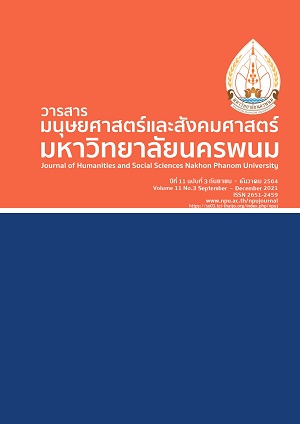Using the ‘Avoid-Shift-Improve’ Approach to Evaluate The 12-Year Development Plan (2009 – 2020) for Bangkok's Sustainable Transportation Goals
Main Article Content
Abstract
This study aimed to evaluate the 12-year development plan for Bangkok Metropolis (2009 – 2020) and to propose recommendations for improving sustainable transportation in the city. A qualitative approach was employed, whereby in-depth interviews were conducted with a total of 15 key informants from public, private, and academic sectors. The ‘Avoid-Shift-Improve’ (ASI) approach was used as a framework to analyse the plan to achieve in policies to limit GHG emission and provide alternative mobility solutions for sustainable transport systems development. This study found that the 12-year development plan did not meet the criteria of ASI. Specifically, an avoidance of increased transportation activity was not found. A jobs-housing plan was not found. And Transit-Oriented Development was not integrated into the plan. Also, easily available existing technologies were not used to manage transportation. On the positive side, there was a shift mode of transportation to public transport and non-motorised transport, however, the demand and supply of transportation services in this regard were imbalanced. Also, the ticket price of mass transit was found to be high and the distance between transportation nodes was disconnected. Thus, the shift to public transportation was generally unsuccessful. Regarding the improvement from conventional to greener technology on vehicle technology and fuel efficiency, the government promoted electric vehicles, but the tax cut policy did not attract buyers. Therefore, the attempt to improve existing forms of transport was ineffective. Six recommendations were drawn from this study; 1) encouragement of mixed land use, 2) increased accessibility and connectivity of mass transit system, 3) integrated ticketing with fare reduction program, 4) bus service quality improvement, 5) tax cut policy for electric cars, and 6) paradigm shift for public transportation after COVID-19 pandemic.
Article Details
References
Curtis, C. (2012). Delivering the 'D' in transit-oriented development Examining the town planning challenge. Journal of Transport and Land Use, 5(3), 83-99. Retrieved from www.jstor.org/stable/26201703
Dhar, S. (2016). A Toolkit for Preparation of Low Carbon Mobility Plan: United Nations Environment Programme, Nairobi.
Dias, L. P., Simões, S., Gouveia, J. P., & Seixas, J. (2019). City energy modelling - Optimising local low carbon transitions with household budget constraints. Energy Strategy Reviews, 26, 100387. doi:https://doi.org/10.1016/j.esr.2019.100387
Energy Sector Management Assistance Program. (2014). Toward Sustainable and Energy Efficient Urban Transport: The World Bank.
Farzaneh, H. (2019). Energy Systems Modeling - Principles and Applications. Singapore: Springer.
Gössling, S. (2018). ICT and transport behavior: A conceptual review. International Journal of Sustainable Transportation, 12(3), 153-164. doi:10.1080/15568318.2017.1338318
Granjo, J. F. O., Nunes, D. S., Duarte, B. P. M., & Oliveira, N. M. C. (2020). A comparison of process alternatives for energy-efficient bioethanol downstream processing. Separation and Purification Technology, 238, 116414. doi:https://doi.org/10.1016/j.seppur.2019.116414
Haugneland, P., Bu, C., & Hauge, E. (2016). The Norwegian EV success continues. Paper presented at the EVS29 International Battery, Hybrid and Fuel Cell Electric Vehicle, Montréal, Québec, Canada.
Loo, B. P. Y., & du Verle, F. (2017). Transit-oriented development in future cities: towards a two-level sustainable mobility strategy. International Journal of Urban Sciences, 21(sup1), 54-67. doi:10.1080/12265934.2016.1235488
Martins, V. W. B., Anholon, R., & Quelhas, O. L. G. (2019). Sustainable Transportation Methods. In W. Leal Filho (Ed.), Encyclopedia of Sustainability in Higher Education (pp. 1847-1853). Cham: Springer International Publishing.
Nakamura, K., & Hayashi, Y. (2013). Strategies and instruments for low-carbon urban transport: An international review on trends and effects. Transport Policy, 29, 264-274. doi:https://doi.org/10.1016/j.tranpol.2012.07.003
Ng, W. (2019). Fuel efficiency standards’ roles in reducing greenhouse gas emissions and air pollutants. PeerJ PrePrints.
OECD. (2017). Urban Transport Governance and Inclusive Development in Korea.
Office of the National Economic and Social Development Board. (2013). Population Projections for Thailand 2010 - 2040. Bangkok Retrieved from http://social.nesdb.go.th/social/Portals/0/Documents/การคาดประมาณ%20e-book.pdf
Pollution Control Department. (2017). Thailand State of Pollution Report 2017. Bangkok: Wongsawang Publishing & Printing CO.,LTD Retrieved from http://www.pcd.go.th/file/AW-Pollution-Report2017.pdf
Prasertsubpakij, D., & Nitivattananon, V. (2013). Assessment of Bangkok Metro Accessibility for Developing Integrated Strategies Using Sustainable Indicators. In (pp. 169-193).
Pyddoke, R., Swärdh, J.-E., Algers, S., Habibi, S., & Zadeh, N. S. (2019). Long-term responses to car-tax policies : distributional effects and reduced carbon emissions. Paper presented at the Working Papers in Transport Economics
Satiennam, T., Jaensirisak, S., Satiennam, W., & Detdamrong, S. (2016). Potential for modal shift by passenger car and motorcycle users towards Bus Rapid Transit (BRT) in an Asian developing city. IATSS Research, 39(2), 121-129. doi:https://doi.org/10.1016/j.iatssr.2015.03.002
Sirikijpanichkul, A., Winyoopadit, S., & Jenpanitsub, A. (2017). A multi-actor multi-criteria transit system selection model: A case study of Bangkok feeder system. Transportation Research Procedia, 25, 3736-3755. doi:https://doi.org/10.1016/j.trpro.2017.05.228
Starkey, & Hine. (2014). Poverty and sustainable transport: How transport affects poor people with policy implications for poverty reduction. UN-Habitat, SLoCaT and ODI.
Strategy and Evaluation Department Bangkok Metropolitan Administration. (2016). Statistical Profile of Bangkok Metropolitan Administration. Bangkok: Religion Affairs Printing Press Office of National Buddhism Retrieved from http://203.155.220.230/m.info/bkkstat/stat_2559_eng.pdf
Sustainable Urban Transport Project. (2011). Sustainable Urban Transport: Avoid-Shift-Improve (A-S-I). Deutsche Gesellschaft für Internationale Zusammenarbeit.
UNDESA. (2014). Results Framework for Sustainable Transport. Retrieved from https://sustainabledevelopment.un.org/content/documents/3817unhabitat.pdf
United Nations. (2012). The Future We Want. Paper presented at the United Nations Conference on Sustainable Development, Rio de Janeiro, Brazil. https://sustainabledevelopment.un.org/content/documents/733FutureWeWant.pdf
Wismans, J., Grahn, M., & Denbratt, I. (2015, 17–20 November, 2015). Low-Carbon Transport: Health and Climate Benefits. Paper presented at the Intergovernmental Ninth Regional Environmentally Sustainable Transport (EST) Forum, Chalmers University of Technology, Gothenburg, Sweden.
Wu, I., & Pojani, D. (2016). Obstacles to the creation of successful bus rapid transit systems: The case of Bangkok. Research in Transportation Economics, 60, 44-53. doi:https://doi.org/10.1016/j.retrec.2016.05.001
Yang, K., & Pojani, D. (2017). A Decade of Transit Oriented Development Policies in Brisbane, Australia: Development and Land-Use Impacts. Urban Policy and Research, 35(3), 347-362. doi:10.1080/08111146.2017.1294537


